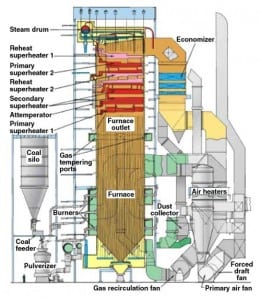Latest
-
News
Court Remands Air Permit for $3B Texas Coal Plant
A Texas state district judge last week remanded an air permit for White Stallion Energy Center’s 1,320-MW coal- and petroleum coke–fired power plant power plant proposed to be built in Matagorda County to the Texas Commission on Environmental Quality (TCEQ), potentially posing a delay for the $3 billion project.
-
News
BOEMRE Takes Steps to Issue First U.S. Lease for Marine Energy Demonstration
The Bureau of Ocean Energy Management, Regulation and Enforcement (BOEMRE) last week announced it would take the first step toward issuing the nation’s first lease that would authorize the testing of equipment designed by Florida Atlantic University to use ocean currents offshore Florida to generate power on the Outer Continental Shelf (OCS).
-
Commentary
Your Guide to Retirement
Someone once said that "life begins at retirement." For people, perhaps, but not for our aging inventory of coal-fired power plants that are slated for retirement during the next decade.
-
Coal
Biomass Boiler Market Remains Unpredictable
Utilities struggling to meet renewable portfolio standards requirements have studied the conversion of existing coal-fired boilers to burn biomass. The results of those studies have been mixed, although test burns continue; the results of one such test are included. Overall, the market is tending toward smaller biomass projects, and the low price of natural gas is perhaps the biggest reason utility-scale projects are now few and far between.
-
Coal
Re-Industrializing America with Clean Coal Technologies
Balancing the rising energy needs of a globally expanding population (most of which lives in poverty) against the need to reduce increases in atmospheric emissions is a monumental problem. What role can clean coal technologies play?
-
O&M
Applying CFD to Optimize Furnaces Cofiring Biomass, and the Impact of Cofiring on SCR
The international policy framework regulating the emissions of greenhouse gases from industrial and utility boilers is in flux. Meanwhile, most boiler owners are evaluating potential strategies for when, not if, more stringent emissions reduction regulations are put in place. One of the most attractive compliance options is the cofiring of biomass in existing coal-fired boilers.
-
Coal
ERCOT Predicts No Coal Retirements from EPA Rules
In surprising findings, given the state’s often-contentious relationship with the Environmental Protection Agency, a study released May 11 by the Texas grid operator concludes that a suite of looming EPA rules to reduce conventional and hazardous air pollution from power plants and to tighten power plant cooling water regulations likely would not force the retirement of any Texas coal plants.
-
Coal
Southern CEO Sees Federal "War on Coal"; Questions Dash to Gas
In a wide-ranging speech on U.S. electricity policy, Southern Co. Chairman, President, and Chief Executive Officer Thomas Fanning said that coal is "under attack" by the federal government, that natural gas may not be the panacea seen by some utilities facing environmental constraints on their coal plants, and that federal proposals to sharply reduce utility hazardous air pollution have unreasonable compliance deadlines that should be extended.
-
Coal
Proposed Clean Energy Agency Has Cost Issue
Even as Senate energy leaders gear up to re-introduce widely supported legislation to create the Clean Energy Deployment Administration, they have acknowledged that the bill faces a heightened problem this term: the need to find nearly $10 billion in offsets to pay for the new green energy financing authority at a time of overwhelming concern about the federal debt.
-
Commentary
In Cap and Trade Fight, Environmentalists Had Spending Edge over Opponents
New research challenges the commonly held view that cap and trade legislation failed because of the spending advantages of opponents and false balance in news coverage. The report, "Climate Shift: Clear Vision for the Next Decade of Public Debate," released by American University Professor Matthew Nisbet on April 25, also shows how well funded both sides of the debate were.


